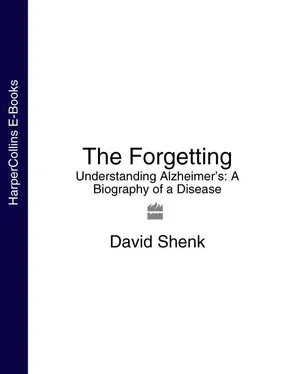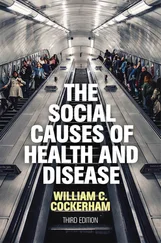For four and a half days they met in Bataan Hall, an old ballroom converted into a civic center. The room had once been used as a shipping-off point for soldiers in World War II, and later named in memory of those same soldiers’ wretched ordeal in the infamous Bataan Death March. Some five hundred prisoners died each day on that trek, about the same number now dying each day in the U.S. from Alzheimer’s disease.
At 8:00 P.M. on the first evening, Stanley Prusiner, a biologist at the University of California at San Francisco and a 1997 recipient of the Nobel Prize in medicine, rose to give the keynote address. “I can’t compete with Monica,” he began with a shrug. “But I think we all know that we wouldn’t learn anything new.”
Barbara Walters’ much-anticipated TV interview with Monica Lewinsky was starting to air on ABC at that very moment, which further fueled the sense of isolation. The local support staff had just raced home to their televisions to catch the well-lighted promotion for the million-dollar book about the sordid affair with the needy President.
No TVs here. The scientists in this large, windowless chamber were distracted by something else: Alzheimer’s disease was about to become an epidemic. Known as senility for thousands of years, Alzheimer’s had only in the past few decades become a major health problem. Five million Americans and perhaps 15 million people worldwide now had the incurable disease, and those numbers would soon look attractive. Beginning in 2011, the first of the baby boomers would turn sixty-five and start to unravel in significant numbers. By 2050, about 15 million people in the U.S. alone would have Alzheimer’s, at an annual cost of as much as $700 billion.
Other industrialized nations faced the same trends. In Japan, one in three would be elderly by 2050. In Canada, the number of elderly would increase by 50 percent while the working-age population increased by just 2 percent. In Britain and elsewhere in industrialized Europe, eighty-five-and-over would continue to be the fastest growing segment of the population. “We have to solve this problem, or it’s going to overwhelm us,” said Zaven Khachaturian, former director of the Alzheimer’s Research Office at the National Institutes of Health. Alzheimer’s had already become a costly and miserable fixture in society. Unless something was done to stop the disease, it would soon become one of the defining characteristics of civilization, one of the cornerstones of the human experience.
They were here to solve this problem.
EARLY STAGE
The other day I was all confused in the street for a split second. I had to ask somebody where I was, and I realized the magnitude of this disease. I realized that this is a whole structure in which a window falls out, and then suddenly before you know it, the whole façade breaks apart .
This is the worst thing that can happen to a thinking person. You can feel yourself, your whole inside and outside, break down ..
—M.
New York, New York
Chapter 1 I HAVE LOST MYSELF
A healthy, mature human brain is roughly the size and shape of two adult fists, closed and pressed together at the knuckles. Weighing three pounds, it consists mainly of about a hundred billion nerve cells—neurons—linked to one another in about one hundred trillion separate pathways. It is by far the most complicated system known to exist in nature or civilization, a control center for the coordination of breathing, swallowing, pressure, pain, fear, arousal, sensory perception, muscular movement, abstract thought, identity, mood, and a varied suite of memories in a symphony that is partly predetermined and partly adaptable on the fly. The brain is so ridiculously complex, in fact, that in considering it in any depth one can only reasonably wonder why it works so well so much of the time.
Mostly, we don’t think about it at all. We simply take this nearly silent, ludicrously powerful electrochemical engine for granted. We feed it, try not to smash it too hard against walls or windshields, and let it work its magic for us.
Only when it begins to fail in some way, only then are we surprised, devastated, and in awe.
On November 25, 1901, a fifty-one-year-old woman with no personal or family history of mental illness was admitted to a psychiatric hospital in Frankfurt, Germany, by her husband, who could no longer ignore or hide quirks and lapses that had overtaken her in recent months. First there were unexplainable bursts of anger, and then a strange series of memory problems. She became increasingly unable to locate things in her own home and began to make surprising mistakes in the kitchen. By the time she arrived at Städtische Irrenanstalt, the Frankfurt Hospital for the Mentally Ill and Epileptics, her condition was as severe as it was curious. The attending doctor, senior physician Alois Alzheimer, began the new file with these notes in the old German Sütterlin script.
She sits on the bed with a helpless expression.
“What is your name?”
Auguste .
“Last name?”
Auguste .
“What is your husband’s name?”
Auguste, I think .
“How long have you been here?”
(She seems to be trying to remember.)
Three weeks .
It was her second day in the hospital. Dr. Alzheimer, a thirty-seven-year-old neuropathologist and clinician from the small Bavarian village of Markbreit-am-Main, observed in his new patient a remarkable cluster of symptoms: severe disorientation, reduced comprehension, aphasia (language impairment), paranoia, hallucinations, and a short-term memory so incapacitated that when he spoke her full-name, Frau Auguste D ——, and asked her to write it down, the patient got only as far as “Frau” before needing the doctor to repeat the rest.
He spoke her name again. She wrote “Augu” and again stopped.
When Alzheimer prompted her a third time, she was able to write her entire first name and the initial “D” before finally giving up, telling the doctor, “I have lost myself.”
Her condition did not improve. It became apparent that there was nothing that anyone at this or any other hospital could do for Frau D. except to insure her safety and try to keep her as clean and comfortable as possible. Over the next four and a half years, she became increasingly disoriented, delusional, and incoherent. She was often hostile.
“Her gestures showed a complete helplessness,” Alzheimer later noted in a published report. “She was disoriented as to time and place. From time to time she would state that she did not understand anything, that she felt confused and totally lost. Sometimes she considered the coming of the doctor as an official visit and apologized for not having finished her work, but other times she would start to yell out of the fear that the doctor wanted to operate on her [or] damage her woman’s honor. From time to time she was completely delirious, dragging her blankets and sheets to and fro, calling for her husband and daughter, and seeming to have auditory hallucinations. Often she would scream for hours and hours in a horrible voice.”
By November 1904, three and a half years into her illness, Auguste D. was bedridden, incontinent, and largely immobile. Occasionally, she busied herself with her bed clothes. Notes from October 1905 indicate that she had become permanently curled up in a fetal position, with her knees drawn up to her chest, muttering but unable to speak, and requiring assistance to be fed.
What was this strange disease that would take an otherwise healthy middle-aged woman and slowly—very slowly, as measured against most disease models—peel away, layer by layer, her ability to remember, to communicate her thoughts and finally to understand the world around her? What most struck Alzheimer, an experienced diagnostician, was that this condition could not fit neatly into any of the standard psychiatric boxes. The symptoms of Auguste D. did not present themselves as a case of acute delirium or the consequence of a stroke; both would have come on more suddenly. Nor was this the general paresis—mood changes, hyperactive reflexes, hallucinations—that can set in during the late stages of syphilis. She was clearly not a victim of dementia praecox (what we now call schizophrenia), or Parkinson’s palsy, or Friedreich’s ataxia, or Huntington’s disease, or Korsakoff’s syndrome, or any of the other well-recognized neurological disorders of the day, disorders that Alzheimer routinely treated in his ward. One of the fundamental elements of diagnostic medicine has always been the exercise of exclusion, to systematically rule out whatever can be ruled out and then see what possibilities are left standing. But Alzheimer had nothing left.
Читать дальше












